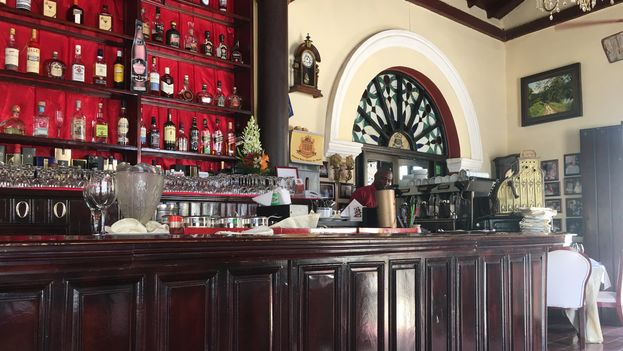
![]() 14ymedio, Marcelo Hernandez, Camagüey, 19 October 2017 — The historical center of the city of Camagüey is once again recovering one of its emblematic attractions, although it is not an old church, a park, or one of the many museums in the city. Paladar 1800 reopened after having been closed for ten months due to a police investigation.
14ymedio, Marcelo Hernandez, Camagüey, 19 October 2017 — The historical center of the city of Camagüey is once again recovering one of its emblematic attractions, although it is not an old church, a park, or one of the many museums in the city. Paladar 1800 reopened after having been closed for ten months due to a police investigation.
Since its reopening in August a steady stream of customers visit the colonial house. No other Camagüey paladar (‘palate’ — the term used for private restaurants in Cuba) has a greater reputation and its state-run competitors are far from being able to emulate the variety of its menu.
Between the 23 September 2016 until 1 August this year, the restaurant was closed and its proprietor spent two months in the jail.
Edel Fernández Izquierdo does not hide his relief at having left prison and being able to resume his food service business, which has been rated as excellent by Tripadvisor. The small businessman was arrested along with 11 other people investigated for alleged economic crimes, but ultimately no charges were lodged against him.
The arrest last year of several owners of very successful private restaurants in Las Tunas and Camagüey, including the owner of 1800, was interpreted by some citizens as a sign of a government plan to put the brakes on the private sector.
The situation escalated to a point of uncertainty among the 33 private restaurant license holders in Camagüey, where in November of last year a meeting was convened between the owners of private restaurants and representatives of the government, together with officials from various state agencies.
At that meeting, the authorities reported that irregularities were detected in the inspections carried out in the sector, such as the presence of uncontracted workers in the establishments, delays or underreporting in the payment of taxes to the National Office of Tax Administration (ONAT), illegal construction, and trade in unauthorized merchandise.
Jesús Polo Vázquez, Economic Vice-President of the Provincial Council Administration, also told the official press that the searches and arrests were simply actions targeted to problems of “legality in the exercise of non-state management,” and that as long as the premises comply with established law no facility would be “unjustifiably closed.”
Now, Hernández Izquierdo is happy to be able to continue the business in his name, unlike other owners who were investigated and who ceded the ownership of their restaurants to a relative to keep them open. This is the case with the restaurant La Herradura in the Villa Mariana neighborhood, whose previous owner, Papito Rizo, was also arrested.
Hernández Izquierdo resumed his business after spending two months in Cerámica Roja prison in Camagüey and the police investigation, which ultimately never went to court, continued after his release.
Since its reopening the Hernandez Izquierdo’s restaurant does not have “half of the drinks” it had available before because during the police search some of the bottles were seized and that still have not been returned, although the owner does not give up the dream that someday he will know “what became of them.”
Outside, under the intense October sun, a tourist guide explained to a group of Canadians this weekend that 1800 serves the best Cuban food in the area. One of the visitors was also interested in the architecture of the large house on Plaza San Juan de Dios, the tourist heart of the city.
The paladar is visited mainly by foreign tourists and Cubans living abroad, but there are local diners who come looking for quality and good service.
Hernández Izquierdo is licensed as a “food and beverage vendor” to work in the hospitality industry.
The limits of the license are strict and Hernandez Izquierdo does not even want to know about exceeding what he is allowed. “If I want to have a man here to make cigars to sell them that is not allowed, among other things because there is no such license,” reflects the owner.
Local authorities have redoubled inspections in recent months to ensure strict compliance with the rules governing the operation of these premises. None can have more than 50 chairs, they must respect the defined opening and closing hours, and be supplied exclusively by products bought in the state stores – backed up by invoices – according to what several owners consulted by this newspaper have confirmed.
Last August, the Cuban government temporarily halted the issuing of licenses to private restaurants and rental houses for tourists, among other activities, in order to “regulate self-employment.” So far the issuance of these permits has not been resumed
Edel Hernández Izquierdo plans to “forget the negative moments” and to return to position himself in Camagüey as a prestigious restaurant. “It is no coincidence that we are well recommended in all the guides and by all travel agencies,” he says with pride. “To keep the name and to make up the lost time, that is my goal.”
“We will continue to serve and generate employment, despite the misunderstandings we are subject to,” confirms the owner of 1800. He smiles and adds, “I like what I do and I will continue to fight.”
